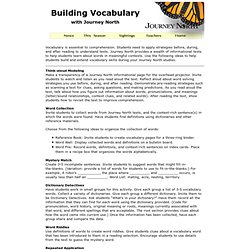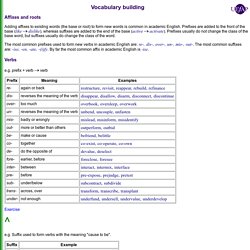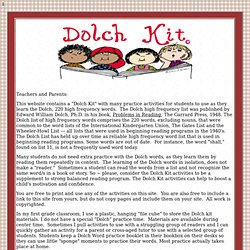

Synonym Finder » Find synonyms, antonyms & definition for (almost) any word.
Journey North. Vocabulary is essential to comprehension.

Students need to apply strategies before, during, and after reading to understand texts. Journey North provides a wealth of informational texts to help students learn about words in meaningful contexts. Use the following ideas to help students build and extend vocabulary skills during your Journey North studies. Think-aloud Modeling Make a transparency of a Journey North informational page for the overhead projector. Invite students to watch and listen as you read aloud the text. Word Collection Invite students to collect words from Journey North texts, and the context-rich sentence(s) in which the words were found.
Choose from the following ideas to organize the collection of words: Reference Book: Invite students to create vocabulary pages for a three-ring binder. Mystery Match Create 3-5 incomplete sentences. Dictionary Detectives Have students work in small groups for this activity. Word Sorts Give students a list of vocabulary words.
Vocabulary: Building. Affixes and roots Adding affixes to existing words (the base or root) to form new words is common in academic English.

Prefixes are added to the front of the base (like dislike), whereas suffixes are added to the end of the base (active activate). Prefixes usually do not change the class of the base word, but suffixes usually do change the class of the word. The most common prefixes used to form new verbs in academic English are: re-, dis-, over-, un-, mis-, out-. Verbs e.g. prefix + verb verb Exercise e.g. Exercise Nouns The most common prefixes used to form new nouns in academic English are: co- and sub-. E.g. prefix + noun noun Exercise e.g. Exercise Adjectives Many adjectives are formed from a base of a different class with a suffix (e.g. The most common suffixes are -al, -ent, -ive, -ous, -ful, -less. e.g. Adjective Exercise e.g. negative + adjective Exercise Mixed e.g. base with both prefix and suffix Adjectives: uncomfortable, unavoidable, unimaginative, inactive, semi-circular Word formation.
Dolch Kit. Teachers and Parents: This website contains a "Dolch Kit" with many practice activities for students to use as they learn the Dolch, 220 high frequency words.

The Dolch high frequency list was published by Edward William Dolch, Ph.D. in his book, Problems in Reading, The Garrard Press, 1948. The Dolch list of high frequency words comprises the 220 words, excluding nouns, that were common to the word lists of the International Kindergarten Union, The Gates List and the Wheeler-Howl List --- all lists that were used in beginning reading programs in the 1940's. The Dolch List has held up over time as reliable high frequency word list that is used in beginning reading programs. Some words are out of date. Many students do not need extra practice with the Dolch words, as they learn them by reading them repeatedly in context. You are free to print and use any of the activities on this site. In my first grade classroom, I use a plastic, hanging "file cube" to store the Dolch kit materials.
Reading Fun: Prefixes, Suffixes, Root Words.